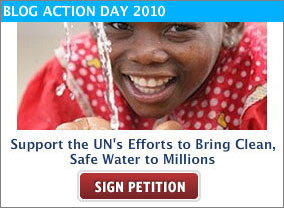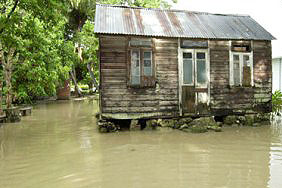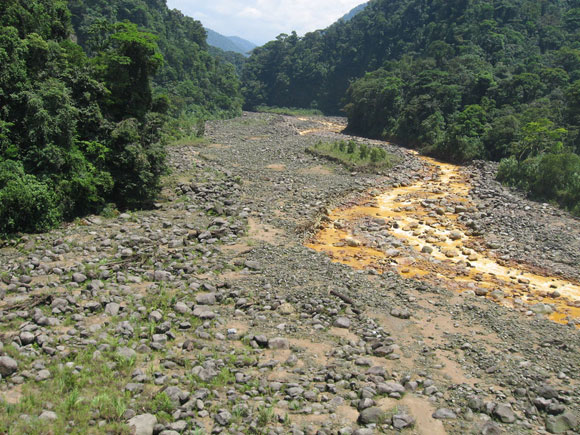 A Blog Action Day on water – how can I not write something? My career started in water resource and wastewater management in Johannesburg (I won’t say how many years ago!). I also came across the following quotes in an article I read last week which I thought would be good for this blog. ‘If global energy habits are the focus for mitigation then the way we use and manage water must be the focus for adaptation (Global Water Partnership 2007) and ‘Water is in the eye of the climate management storm’ (Intergovernmental Panel on Climate Change (IPCC) report (2007). I often think how fortunate I was to be involved in the water sector in the early 1990’s in South Africa. There was a buzz during that time, as we were working on the development and adoption of a very progressive national water act and setting up participatory catchments management committees. We started to look at how we could all benefit from the physical resources we had: how to better allocate this scarce and finite water resource amongst all the competing activities that depended on it, and ensuring water quality was maintained and improved so that it didn’t limit its uses (current and future demands) or cause damage.
A Blog Action Day on water – how can I not write something? My career started in water resource and wastewater management in Johannesburg (I won’t say how many years ago!). I also came across the following quotes in an article I read last week which I thought would be good for this blog. ‘If global energy habits are the focus for mitigation then the way we use and manage water must be the focus for adaptation (Global Water Partnership 2007) and ‘Water is in the eye of the climate management storm’ (Intergovernmental Panel on Climate Change (IPCC) report (2007). I often think how fortunate I was to be involved in the water sector in the early 1990’s in South Africa. There was a buzz during that time, as we were working on the development and adoption of a very progressive national water act and setting up participatory catchments management committees. We started to look at how we could all benefit from the physical resources we had: how to better allocate this scarce and finite water resource amongst all the competing activities that depended on it, and ensuring water quality was maintained and improved so that it didn’t limit its uses (current and future demands) or cause damage.

Using a wide range of information for decisions and including the viewpoints from the diversity of people around the table, who were linked to the river in different ways, was very powerful. Seeing the user group and pollution track maps of the river basin captured by Geographic Information Systems (GIS - a new mapping tool then) was also pretty awesome too. This approach is referred to as Integrated Water Resource Management (IWRM) and is a way to deal with complex situations, multiple drivers of change and conflicting interests. It is still relevant as a mechanism to deal with the added variations in water demand and supply from climate change. Several years later I moved to work on water resource management issues in Guyana, the land of many waters. I used to say to friends that I was extending my country experience from a water scarce to a water rich one. It is interesting as a climate change adviser now that many discussions involve tackling both water availability increases and decreases at the same time and building in the flexibility to deal with both these situations at the country level.

We experience climate variability here in the Caribbean between seasons (dry and wet months) and between years (El Nino/La Nino). Just a few months ago many Caribbean states were experiencing unprecedented drought and then over the last two weeks we have had extensive flooding and damage from storms on several islands (some not even due to hurricanes). If we can improve the way we currently deal with today's variability, this will certainly stand us in good stead to deal with longer term changes in climate. I know that work is underway in our region to improve seasonal forecasting to support strategic planning given the changing circumstances (for more information see the Caribbean Institute for Meteorology & Hydrology (CIMH)). A simple message to end this blog today, and one that is often used by policy colleagues when discussing what to do is to ‘look forward before you leap’. Use scenarios to examine climate risks and resilience of the system in the future. Consider flexible and 'no regrets' action from the outset of new programmes and not as an afterthought. For example, choose actions that also have other benefits; seed varieties that do well whether rains are good or not. Or reversible actions like planning restrictions in flood zones that can be relaxed later if the beneficial impacts don’t materialise. When we bring into focus the possible consequences or likely environmental and related social effects of a project or plan, before decisions are made, we can direct development and water use in a more sustainable course. Read more water stories this Blog Action Day from our friends at the Foreign Office

1 comment
Comment by walter Pile posted on
water is life and must be provided to the needy where there is lack of it.This would be a vital encouragement in developments in areas where poverty has crippled the masses.